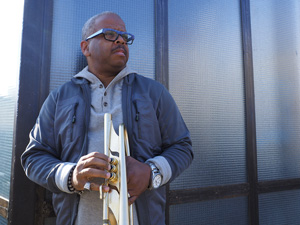
“Blanchard’s body of work is one of the broadest and most imposing of any living jazz musician.” — New York Times
Terence Blanchard has been a consistent artistic force for making powerful musical statements concerning painful American tragedies – past and present. A true “Renaissance” man, Blanchard stands tall as one of jazz’s most-esteemed trumpeters and defies expectations by creating a spectrum of artistic pursuits. Boundary-breaking and genre-defying, Blanchard is recognized globally as a dazzling soloist and a prolific composer for film, television, opera, Broadway, orchestras and for his own ensembles. In fact, leading theater magazine TheaterMania recently cited Blanchard as “the most exciting American composer working in opera today.”
An eight-time Grammy Winner and twice Oscar-nominated film composer, Blanchard became only the second African-American composer to be nominated twice in the original score category at the 2022 Academy Awards, duplicating Quincy Jones’ feat from 1967’s In Cold Blood and 1985’s The Color Purple. Blanchard’s work has placed him at the forefront of giving voice to human rights, civil rights, and racial injustice, including the 2016 album “Breathless,’’ an elegy for Eric Garner, who was killed by police and whose words, “I can’t breathe,” became a civil rights rallying cry.
Blanchard is also heralded as a two-time opera composer whose Fire Shut Up in My Bones is based on the memoir of celebrated writer and New York Times columnist Charles Blow. The Metropolitan Opera premiered Fire Shut Up in My Bones on September 27, 2021, to open their 2021-22 season in New York, making it the first opera composed by an African American composer to premiere at the Met in its 138-year history. The recording of those performances received a Grammy Award for “Best Opera Recording,” and The New York Times heralded “Fire” as “inspiring,” “subtly powerful” and “a bold affecting adaptation of Charles Blow’s work.” Of the historical moment, Blanchard said, “I don’t want to be a token, but a turnkey.” “Fire” has been widely recognized as one of our nation’s most important cultural milestones and returns to the Met for a highly-anticipated second run in April of 2024.
Blanchard’s first opera, Champion, about the troubled life of boxer Emile Griffith, premiered in 2013 and starred Denyce Graves with a libretto from Pulitzer Prize Winner, Michael Cristofer. Champion premiered at the Met in April 2023 to widespread critical acclaim. It too received a 2024 Grammy for “Best Opera Recording.”
But there is a center of gravity. It’s Blanchard’s beautiful, provocative, inspiring jazz recordings that undergird all these projects. The same holds true now as it did early in his career in 1994 when he told DownBeat: “Writing for film is fun, but nothing can beat being a jazz musician, playing a club, playing a concert.”
From his expansive work composing the scores for over 20 Spike Lee projects over three decades – ranging from the documentary When the Levees Broke to the recent Lee films, BlacKkKlansman and Da 5 Bloods (both of which garnered Blanchard Oscar nominations), Terence has interwoven beautiful melodies that create strong backdrops to human stories like Regina King’s One Night in Miami; Kasi Lemmons’ Eve’s Bayou; George Lucas’ Red Tails; the HBO drama series Perry Mason (now in its second season); Apple TV’s docuseries They Call Me Magic (for which Blanchard received an Emmy nomination) and Gina Prince Bythewood and Viola Davis’ critically acclaimed film, The Woman King.
In his expansive career as a recording leader Blanchard delivered Absence, a collaboration with his longtime E-Collective band and the acclaimed Turtle Island Quartet which received Grammy nominations in November 2021 for Best Instrumental Jazz Album and Best Improvised Jazz Solo for Blanchard. Recorded in February 2020 just before the Covid-19 lockdowns, Absence started out as a project to show gratitude to Wayne Shorter. “I knew that Wayne wasn’t feeling well at the time, so I wanted to honor him to let him know how much he has meant to me,” says Blanchard who today lives in Los Angeles as well as in his native New Orleans. “When you look at my own writing, you can see how much I’ve learned from Wayne. He mastered writing compositions starting with a simple melody and then juxtaposing it against the harmonies that come from a different place to make it come alive in a different light.”
Born in New Orleans in 1962, Blanchard is a musical polymath who launched his solo career as a bandleader in the 1990s. Since then, he has released 20 solo albums, garnered 15 Grammy nominations, composed for the stage and for more than 60 films, and received 10 major commissions. He has been named an official 2024 NEA Jazz Master as well as a member of the 2024 class of awardees for the esteemed American Academy of Arts and Letters, and currently serves as the Executive Artistic Director for SF Jazz, the largest non-profit jazz presenter in the world.
Regarding his consistent attachment to artistic works of conscience, Blanchard confesses, “You get to a certain age when you ask, ‘Who’s going to stand up and speak out for us?’ Then you look around and realize that the James Baldwins, Muhammad Alis and Dr. Kings are no longer here…and begin to understand that it falls on you. I’m not trying to say I’m here to try to correct the whole thing, I’m just trying to speak the truth.” In that regard, he cites unimpeachable inspirations. “John Coltrane playing Alabama, even Louis Armstrong talking about what was going on with his people any time he was interviewed. Herbie Hancock & Wayne Shorter who live by their Buddhist philosophy and try to expand the conscience of their communities. I’m standing on all their shoulders. How dare I come through this life having had the blessing of meeting those men and not take away any of that? Like anybody else, I’d like to play feel good party music but sometimes my music is about the reality of where we are.”
-April 2024

